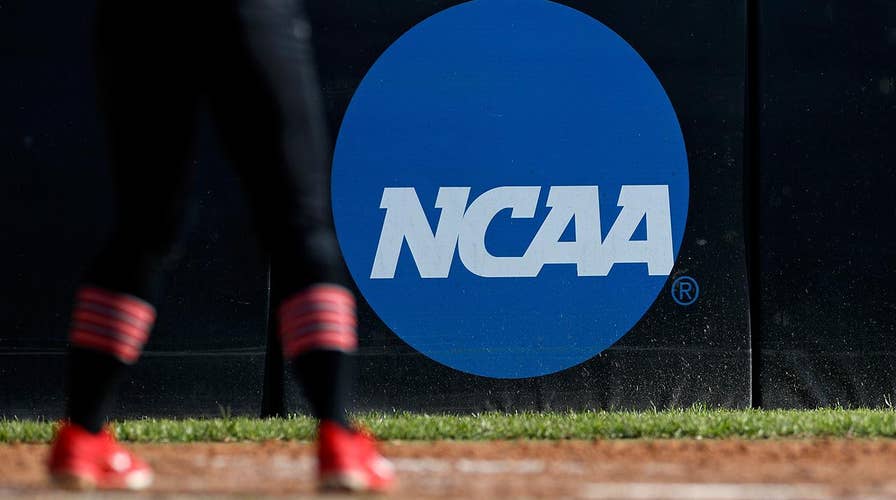NCAA reverses course, will allow athletes to make money off name, images
College athletes will now be able to endorse brands and accept sponsors; Kristin Fisher reports.
The NCAA finally emerged from the shadows of the dark ages. On Tuesday, the preeminent collegiate governing body unanimously voted to allow student-athletes to profit off their own image and likeness.
“We must embrace change to provide the best possible experience for college athletes,” said Michael V. Drake, chair of the board and president of The Ohio State University in a statement. “Additional flexibility in this area can and must continue to support college sports as a part of higher education. This modernization for the future is a natural extension of the numerous steps NCAA members have taken in recent years to improve support for student-athletes, including full cost of attendance and guaranteed scholarships.”
That sounds like a lot of words to describe taking ethical responsibility, finally, a few decades too late.
SEN. JOSH HAWLEY: CHINA DOESN'T DESERVE RESPECT (OR LOYALTY) FROM AMERICAN CORPORATIONS
Members of the NCAA Board of Governors are already patting themselves on the back publicly while undoubtedly privately bemoaning the actual product, including the star football and basketball players who will now pull a profit. For an entity that raked in approximately $1 billion in the 2016-2017 season, it is absurd this decision took as long as it did.
More from Opinion
So should we believe this change of heart stems from a newfound generosity? No. Quite simply, Democratic California Gov. Gavin Newsom and Rep. Mark Walker, R-N.C., deserve the lion's share of the credit. Two politicians living in two different states from two different sides of the aisle successfully leveraged their political platforms to squeeze the NCAA in the right direction.
CLICK HERE TO GET THE OPINION NEWSLETTER
In September, Newsom signed into California law the Fair Pay to Play Act, which mandates colleges in California refrain from punishing athletes for collecting endorsement cash. Not to be forgotten, it was a woman, state Sen. Nancy Skinner, who introduced the law in hopes of leveling the playing field on a national scale. In Congress, Walker introduced the proposal around the time of March Madness and discussed it on Fox Nation.
The fact is the NCAA cannot continue to enforce archaic rules while top recruits for the most lucrative sports skirt them and migrate to the sunny beaches of California.
Yet, critics argue the same trite line: "They’re already getting a free education.” As wonderful as higher education is (despite burdening our country with $1.6 trillion in student loan debt), there is no guarantee a piece of paper secures a job. That same athlete you may deem “entitled” might end up with a serious injury from playing a collegiate sport for the school and fans.
What do you give back to them? If those student-athletes end up waiting tables after graduation, plenty would agree a few autograph signings and endorsement packages could have greatly assisted their next stage of life. Not everyone turns out to be a Pro Bowl NFL player or an All-Star NBA point guard. This NCAA change will greatly benefit D2 and lower tier D1 athletes, not just the stereotypical superstars of top programs.
For those still scratching their heads in confusion and anger over the NCAA joining the 21st century, consider a few examples. In Johnny Manziel’s Heisman Trophy winning year, the Texas A&M bookstore earned about $1 million in No. 7 jersey sales and Manziel-related products. In case you’re unfamiliar with the sketchiness of the system, the NCAA only produces numerical jerseys to get around the pesky compensation issue involving student-athletes — even though everyone knows which player represents the jersey they purchase. Manziel took home nothing.
In response to EA Sports' popular NCAA video games, Ed O’Bannon, a former UCLA basketball player, filed a federal lawsuit in 2009. He argued Division I men’s basketball and football players should receive compensation for commercial use of their likeness, image and name. Following appeals in 2014, it was decided the NCAA's amateurism rules were unlawful, but it’s granted exception from anti-trust violations since student-athletes are compensated with the cost of college attendance.
CLICK HERE TO GET THE FOX NEWS APP
It boils down to this: Free tuition certainly is a gift; one these student-athletes fight their entire adolescent lives to achieve. They earn it. Regardless, a higher education shouldn’t be used as a bartering chip to avoid a lawsuit. We live in a capitalist society, and as such, true talent should reap the financial benefits of its product.
The Tim Tebows of the world, who still reap the economic benefits of a glorified collegiate career a decade after it ends, should perhaps amend their rants about "love of the game." Times are indeed changing, and so is the NCAA hypocrisy.









































